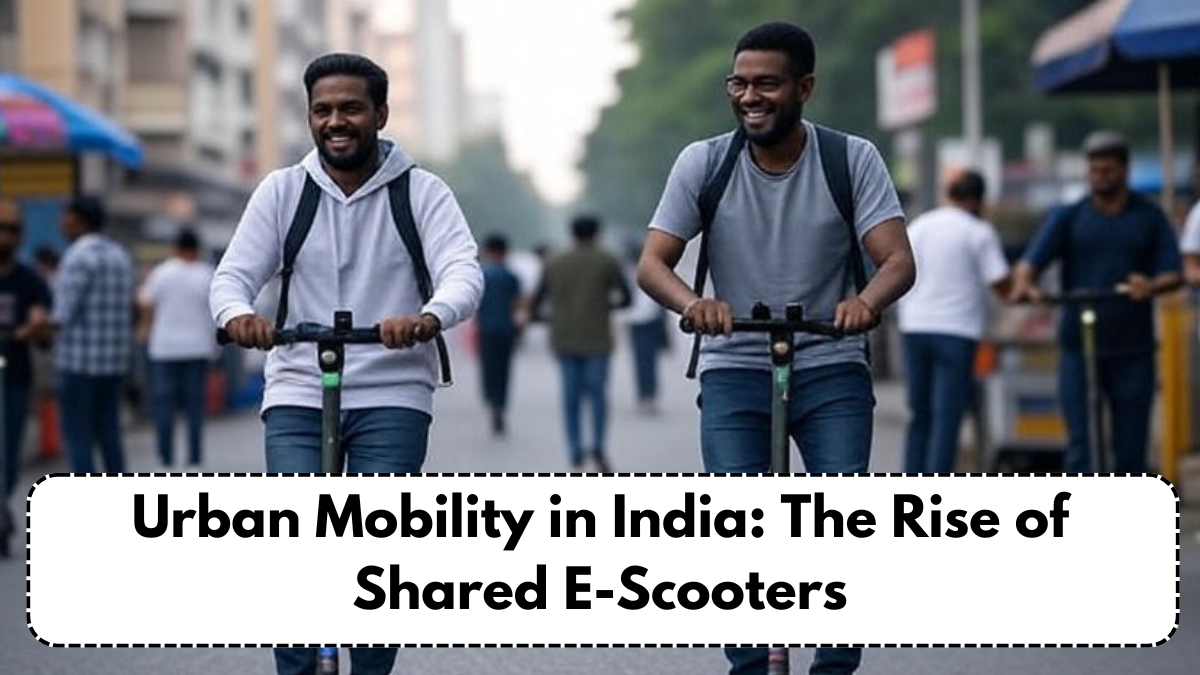The rapid growth of cities has brought both opportunities and challenges for urban mobility India. With rising populations, traffic congestion, and pollution, traditional modes of transport are proving insufficient. In this context, shared scooters have emerged as a promising solution to address last-mile connectivity, reduce dependency on cars, and promote greener travel choices. The rise of shared electric scooters is reshaping how people move within cities, signaling a new era for sustainable and smart mobility.

Urban Mobility Challenges in India
The pressure on urban mobility India comes from multiple factors. Expanding urbanization, coupled with inadequate public transport infrastructure, has made commuting a daily struggle for millions. Major issues include:
- Severe traffic congestion in metro cities.
- Air pollution from fuel-based vehicles.
- Inadequate last-mile connectivity to metro and bus stations.
- Lack of affordable transport options for short distances.
Shared scooters directly address many of these challenges by providing an accessible, cost-effective, and eco-friendly travel option for short commutes.
Table: Comparison of Mobility Options in Indian Cities
Transport Option |
Pros |
Cons |
|---|---|---|
Private Cars |
Comfort, flexibility |
Traffic congestion, pollution, parking issues |
Public Buses/Metro |
Affordable, mass transport |
Overcrowding, last-mile gaps |
Auto Rickshaws |
Easy availability, flexible routes |
High fares for short rides, emissions |
Shared Scooters |
Affordable, eco-friendly, last-mile solution |
Limited battery range, safety concerns |
The table illustrates how shared scooters stand out as a viable middle-ground option between expensive private transport and overburdened public systems.
The Rise of Shared Scooters in Indian Cities
Startups and mobility companies are driving the adoption of shared scooters across metro cities like Bengaluru, Delhi, and Pune. Users can easily book scooters through mobile apps, pay per ride, and drop them at designated points. This flexibility makes them ideal for short urban trips.
Key reasons for their popularity in urban mobility India include:
- Affordability compared to taxis or auto rickshaws.
- Convenience for last-mile connectivity.
- Eco-friendly appeal due to electric operation.
- Reduced travel times during peak traffic hours.
With growing environmental awareness, younger commuters in particular are embracing shared scooters as part of their daily transport mix.
Policy and Infrastructure Support
The success of urban mobility India through shared mobility depends heavily on supportive policies and infrastructure. State governments and city municipalities are beginning to encourage shared scooters by designating parking zones, offering subsidies for electric vehicles, and integrating them into smart city plans.
However, challenges remain. Battery swapping infrastructure is still limited, safety regulations for riders need strengthening, and awareness campaigns on helmet use and traffic rules are essential. Without addressing these gaps, the full potential of shared e-scooters cannot be realized.
Conclusion
The growth of shared scooters is a significant milestone in the journey of urban mobility India. By providing sustainable, affordable, and efficient last-mile transport, they are changing how people move within cities. To ensure long-term success, policymakers, private companies, and citizens must collaborate to improve infrastructure, ensure safety, and expand access. If implemented thoughtfully, shared e-scooters can become a cornerstone of India’s sustainable urban transport future.
FAQs
How do shared scooters improve urban mobility in India?
They provide affordable, eco-friendly solutions for last-mile connectivity, reducing dependence on private cars.
What are the main challenges for shared scooters in India?
Challenges include limited charging infrastructure, safety concerns, and lack of awareness about traffic rules.
Are shared scooters affordable compared to other transport options?
Yes, they are cheaper than auto rickshaws or taxis, especially for short-distance travel.
What role does government policy play in supporting shared scooters?
Supportive policies, subsidies, and designated parking zones are essential for the growth of shared scooters.
Can shared scooters reduce traffic congestion in Indian cities?
Yes, by reducing reliance on private vehicles, shared scooters can ease congestion and promote sustainable urban mobility India.
Click here to learn more